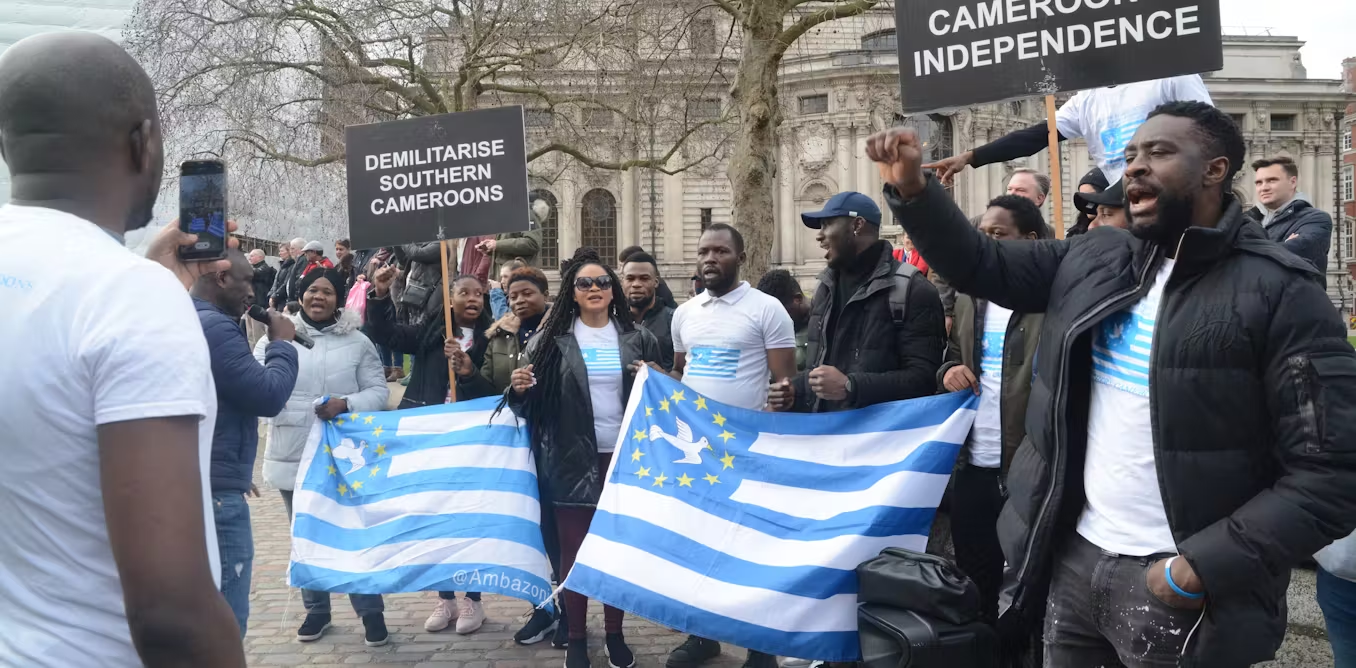
Cameroon may seem of little significance in American geo-strategic considerations. Still, the Central African country‘s natural resources and function as a stabilizing force in the Central African sub-region make it ideally placed to attract US attention.
It is also a prized partner of the US in the fight against terrorism, particularly the Boko Haram insurgency in the Lake Chad region, as well as maritime piracy.
But Cameroon’s historical stability has been stretched to the limits not only by terrorism but, more importantly, by Southern Cameroon’s pro-independence insurgency.
The Southern Cameroons liberation struggle, also known as the Ambazonia War of independence, has its roots in the colonial era.
After World War I, German Kamerun was divided between the British and the French, with one of the territories taken by the United Kingdom becoming known as Southern Cameroons. In 1961, Southern Cameroons voted to join French Cameroun, forming a federal state of two parties “equal in status”. However, the central government gradually eroded the autonomy and cultural identity of the former UN Trust Territory.

Tensions escalated in 2016 when lawyers and teachers in Southern Cameroons (currently referred to as Northwest and Southwest) protested against the imposition of the French legal and educational systems.
The government’s harsh response led to the formation of liberation groups demanding outright independence for the former United Nations Trust Territory of British Southern Cameroons, now also referred to as Ambazonia. The conflict has since resulted in significant violence, displacement, and loss of life with the
International Crisis Group saying that at least 6000 people have since been killed. The numbers are decidedly much higher.
The crisis could define the Trump second term’s Cameroon policy. To understand which direction that policy takes, it’s critical to examine what policy the first Trump administration adopted and what the kinds of people he has chosen for his second tenure may mean for the former United Nations Trust Territory of British Southern Cameroons.
During his first term, Trump in 2019 famously signaled his desire to terminate the designation of the Republic of Cameroon as a beneficiary sub-Saharan African country under the African Growth and Opportunity Act (AGOA).

That means Cameroon would no longer be able to export its goods to the US preferentially.
Trump explained that the decision was predicated upon the continued violation by Cameroon of human rights as it executed its war on pro-independence movements in the former United Nations Trust Territory of British Southern Cameroons. That decision went into effect on January 1, 2020.
“I am taking this step because I have determined that the Government of Cameroon currently engages in gross violations of internationally recognized human rights, contravening the eligibility requirements of section 104 of the AGOA,” Trump said at the time.
“Despite intensive engagement between the United States and the Government of Cameroon, Cameroon has failed to address concerns regarding persistent human rights violations being committed by Cameroonian security forces. These violations include extrajudicial killings, arbitrary and unlawful detention, and torture.
“Accordingly, I intend to terminate the designation of Cameroon as a beneficiary sub-Saharan African country under the AGOA as of January 1, 2020. I will continue to assess whether the Government of Cameroon engages in gross violations of internationally recognized human rights in accordance with the AGOA eligibility requirements.”

That ban has not been revoked, although authorities in Yaounde tried frantically to rejoin AGOA under the Biden administration. That attempt highlights the evident toll the ban has had on the country’s ailing economy.
A second Trump administration may not reverse course, especially as government forces have continued to carry out mass human rights violations in its execution of the war against Anglophone separatists.
But the apparent notes on AGOA by Trump could be contradicted by what is seen as Trump’s distaste for immigrants and asylum seekers. Mr. Trump campaigned on cracking down on what he considers illegal migration to the United States. As the government crackdowns on Southern Cameroons insurgents, many have always seen the US as a safe harbor. Trump’s anti-immigrant stand could make life harder for people who, because of persecution, want to seek refuge in the US.

In 2019, Trump actually deported 100 Cameroonians, most of whom were fleeing attacks in the former United Nations Trust Territory of British Southern Cameroons. Many of them are back on US soil, benefiting from the Biden administration’s Temporary Protected Status. Still, with Trump promising the mass deportation of undocumented workers and promising to end various programs that would make it easier for people to enter the United States, these people, and thousands of others, could again find themselves on the way out.

Yet, if one were to look at some of his cabinet picks, there may be slivers of good news for the Ambazonia struggle in the second Trump administration.
“If President Trump selects certain people whose names have come up for high-level posts, the Yaounde regime will get much more pressure over its mistreatment of its Anglophone population. Cameroon Gov’t has gotten a relatively free ride with Biden; hopefully, that will change,” said Tibor Nagy, the former Assistant Secretary of State for African Affairs under Trump’s first administration.
And that prediction could play out with Senator Marco Rubio occupying the portfolio of Secretary of State.

Mr. Rubio was one of 20 US senators who submitted Resolution 684 to US Congress urging the Government of Cameroon and pro-independence armed groups from the former United Nations Trust Territory of British Southern Cameroons to ‘end all violence, respect the human rights of all Cameroonians, and pursue a genuinely inclusive dialogue toward resolving the ongoing civil conflict in Anglophone Cameroon.”
As Secretary of State, Mr. Rubio could follow through on that resolution by putting enormous pressure on the regime in Yaounde.
So, a second Trump administration could combine hope and despair for Southern Cameroonians.



